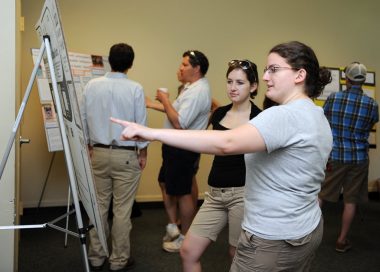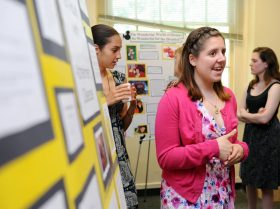People with disabilities have made significant progress raising awareness of public policy issues that affect them in recent years, advances that students in an Elon University interdisciplinary course learned this spring as they researched the history, culture and psychology of a population that is often overlooked.

Fifteen sophomores in “Honors 232: Disability – Past and Present” shared their research May 9 in a poster presentation on the third floor of Mooney building. From an examination of the way Disney movies portray characters with disabilities, to the legal background of executing people with intellectual disabilities (mental retardation), the posters illustrated the many ways that the word “disability” can be used.
Topics at the poster presentation included the identification and strategies for participation in sports by children with disabilities; effects of the use of American Sign Language; age discrimination; and the prevalence and significance of Post Traumatic Stress Disorder in foster care children.
With so many facets to studying disabilities, students said they’ve grown a newfound appreciation for disabled individuals, whether people in wheelchairs, those suffering from bipolar disorder, or even those with vision or hearing loss.
And the professors leading the course say that was exactly their goal.
“I wanted them to leave with open eyes so that they see a group of marginalized people who they have not seen before, and with open ears so they hear the voices of people they have not heard before,” said associate professor Carolyn Stuart in the School of Education, who co-taught the course with history professor Mary Jo Festle. “I want them to be aware.”

This spring marks the third time Stuart and Festle have taught together on disabilities. In addition to classroom lessons, students engaged with the community through service-learning at the Blakey Hall assisted care facility on University Drive in Elon, where they worked with Alzheimer’s patients in an assignment designed to show yet another element of disability.
The duo selected different kinds of disabilities, with an examination of the Deaf community, disabilities related to war veterans, manic depressive disorder, Asperger’s syndrome, blindness and intellectual disabilities.
Nor are the ideas explored in the course new only to students.
“I’m more aware and don’t make the same assumptions (I once did),” Festle said. “One assumption is that people with disabilities should be pitied. Pity isn’t something that most of the people we read about wanted. They appreciate being understood, but they appreciate being seen as whole people. They are people with varying characteristics and strengths and things to offer.”
Students said they were unaware of the issues involving people with disabilities in American society and impressed at the perseverance that advocacy organizations have shown since the 1970s in having their voices heard. The class also demonstrated the need to keep up pressure on policymakers.
“There’s still work to be done,” said Catherine Bell, a political science major from Raleigh, N.C. “Most of the progress for disability rights will only take pace if you’re an advocate. You can’t stand on the sidelines and hope things work out on their own. They won’t. And many people with disabilities claim their disability, and they’re very accepting of it. They own it and try to show that you can still have a very meaningful life, and that it’s not a detriment to your quality of life.”
Elise Noyes, a sophomore psychology major from Charlottesville, Va., focused her poster research on the most effective method for including children with special learning needs into regular public elementary school classrooms. Her interest in the special needs population stems from high school volunteer work at therapeutic riding barns, as well as her Elon volunteer experience with Kopper Top Life Learning Center in North Carolina.
“It was really cool to see it from an academic perspective,” she said. “Most of my experience has been working with individuals with disabilities, but to hear what scholars are saying about how disabilities are socially constructed and the issues related to that, it gave a complementary perspective to something that’s been a theme throughout my life.”


